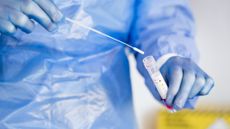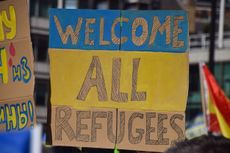The Week Unwrapped: Crypto-positivity, Barbados and a 3D-printed eye
Why is Thailand betting big on crypto-currency? Will Barbados benefit from being a republic? And what can we expect from the next generation of prosthetics?
Olly Mann and The Week delve behind the headlines and debate what really matters.
You can subscribe to The Week Unwrapped wherever you get your podcasts:
In this week’s episode, we discuss:
Subscribe to The Week
Escape your echo chamber. Get the facts behind the news, plus analysis from multiple perspectives.

Sign up for The Week's Free Newsletters
From our morning news briefing to a weekly Good News Newsletter, get the best of The Week delivered directly to your inbox.
From our morning news briefing to a weekly Good News Newsletter, get the best of The Week delivered directly to your inbox.
Thailand turns to crypto
The Thai government this week announced plans to turn the country into a “crypto-positive society”, meaning that digital currencies such as Bitcoin could be used for mainstream purchases. Is this just a PR stunt, or a serious attempt to rebuild the Thai economy? The country lost $80bn in tourist revenue during the pandemic, so it might even be a ploy to attract a higher-spending breed of international visitor. Whatever the intention, it’s another signal that we’re never going back to pre-Bitcoin days.
The Republic of Barbados
Earlier this week the island of Barbados became a republic, removing the Queen as head of state and replacing her with an elected president. Amid the pageantry, what does it all mean for Barbadians, for the Crown, and for the Commonwealth? Will others follow suit? And how will the island nation long referred to as the “Little England” continue to reimagine itself 400 years after it was colonised and 55 years after it gained independence?
Printed prosthetics
Steve Verze, an engineer who lives in Hackney, north London, has become the first person in the world to receive a prosthetic eye that was made using a 3D printer. This technique has two advantages: it requires only a digital scan of the eye socket rather than an invasive physical mould, and the result is more lifelike than a glass eye produced by an artist. As medical applications for 3D printing proliferate, it’s likely that even more complex body parts will follow – with working internal organs the holy grail.
Create an account with the same email registered to your subscription to unlock access.
Sign up for Today's Best Articles in your inbox
A free daily email with the biggest news stories of the day – and the best features from TheWeek.com
-
 'Good riddance to the televised presidential debate'
'Good riddance to the televised presidential debate'Instant Opinion Opinion, comment and editorials of the day
By Harold Maass, The Week US Published
-
 Caitlin Clark the No. 1 pick in bullish WNBA Draft
Caitlin Clark the No. 1 pick in bullish WNBA DraftSpeed Read As expected, she went to the Indiana Fever
By Peter Weber, The Week US Published
-
 Today's political cartoons - April 16, 2024
Today's political cartoons - April 16, 2024Cartoons Tuesday's cartoons - sleepyhead, little people, and more
By The Week US Published
-
 Would North Korean weapons tilt the war Russia’s way?
Would North Korean weapons tilt the war Russia’s way?Today's Big Question Putin wants to boost ‘depleted stocks’ but Pyongyang’s arms may be in poor condition
By Chas Newkey-Burden Published
-
 Robotyne: does liberated village signal success of Ukraine counter-offensive?
Robotyne: does liberated village signal success of Ukraine counter-offensive?Today's Big Question Russia deploys crack paratroopers to try to stall key Ukrainian advances
By Arion McNicoll Published
-
 The Week Unwrapped: Korean succession, terror by algorithm and German disquiet
The Week Unwrapped: Korean succession, terror by algorithm and German disquietpodcast Could a 10-year-old girl rule North Korea? Will an Isis victim upend web law? And why is Germany upset with its Oscars contender?
By The Week Staff Published
-
 The Week Unwrapped: Chinese chips, the Pope in Africa and podcasting
The Week Unwrapped: Chinese chips, the Pope in Africa and podcastingpodcast Is China losing the microchip war? What is the Vatican doing in South Sudan? And has the podcast tide turned?
By The Week Staff Published
-
 The Week Unwrapped: Sex and health, the Earth’s core and another new year
The Week Unwrapped: Sex and health, the Earth’s core and another new yearpodcast Is the NHS failing British women? What’s going on at the centre of our planet? And what’s in a date?
By The Week Staff Published
-
 The Week Unwrapped: Antisocial Saudis, hormone therapy and retro tech
The Week Unwrapped: Antisocial Saudis, hormone therapy and retro techpodcast Why is Saudi Arabia investing in – and banning – social networks? Will new research make life easier for trans women? And is the future of technology dumb?
By The Week Staff Published
-
 The Week Unwrapped: AI in court, Germans in Taiwan and ghostwriters
The Week Unwrapped: AI in court, Germans in Taiwan and ghostwriterspodcast Could artificial intelligence replace lawyers? What does Taiwan want from Germany? And are ghostwriters becoming less ghostly?
By The Week Staff Published
-
 The Year Unwrapped: White refugees, Aegean islands and celebrity gossip
The Year Unwrapped: White refugees, Aegean islands and celebrity gossippodcast Was 2022 the year of the white refugees? What’s really going on in the Aegean sea? And why are we so obsessed with showbiz scandals?
By The Week Staff Published